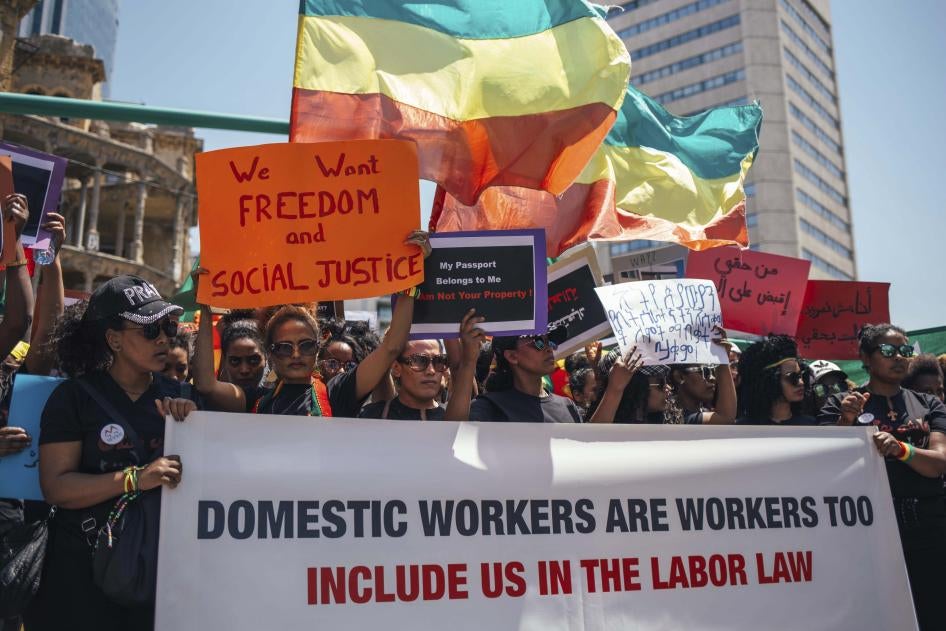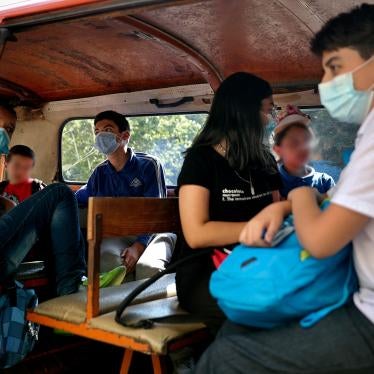Lebanon’s restrictive and exploitative kafala (sponsorship) system traps tens of thousands of migrant domestic workers in highly abusive conditions amounting, at worst, to modern slavery. The law fails to protect the workers, and the establishment has no interest in changing the current system.
Lebanon’s Labour Ministry estimates that the country hosts 250,000 migrant domestic workers, the majority of them women from Africa and Asia. Article 7 of the Labour Law specifically excludes migrant domestic workers, denying them protections that other workers are entitled to, including a minimum wage, limits on working hours, a weekly rest day, overtime pay, and freedom of association. Instead, their status in Lebanon is regulated by the kafala system, a restrictive regime of laws, regulations and customary practices that ties migrant workers’ legal residency to their employers. Workers cannot leave or change jobs without their employers’ consent. Those who leave their employers without permission risk losing their legal residency and face detention and deportation.
The high degree of control over workers’ lives under the kafala system has led to cases of human trafficking, forced labour, exploitation and more. Human Rights Watch and local organizations frequently document the non-payment of wages, forced confinement, withholding of identity documents, excessive working hours, and verbal, physical and sexual abuse. Amidst Lebanon’s economic crisis and the Covid-19 pandemic, incidents of such abuse against migrant domestic workers have increased. The International Labour Organization has warned that migrant workers now face conditions that “greatly increase their risk of entering forced or bonded labour”.
With entire families at home and children out of school, domestic workers have been forced to work longer hours, often even on rest days. Such overwork has been known to result in exhaustion, illness, depression and even suicide. As the national currency depreciated and inflation increased, many employers shifted the economic burden onto their workers and slashed their salaries – if they paid them at all.
Employers have abandoned hundreds of workers outside consulates or embassies, often without money, passports, their belongings, or tickets for the flight back to their home countries. One employer posted a Nigerian domestic worker “for sale” on a Facebook page used for trading second-hand items such as furniture and clothing. After media reports and following outrage in Nigeria and calls from the Nigerian authorities, the Lebanese authorities arrested the employer for violating the country’s human trafficking laws.
The exploitation and abuse under the kafala system has led many workers to commit suicide or die while trying to escape their employers. A 2008 Human Rights Watch investigation found that one domestic worker dies every week from unnatural causes, with suicide and attempted escapes being the most common. Though it has not been possible to replicate this research more recently due to a lack of accurate statistics, the media continue to report deaths of domestic workers in similar circumstances.
The Lebanese judiciary fails to protect migrant domestic workers or hold employers accountable when they violate the workers’ basic rights. The lack of accessible complaint mechanisms, as well as restrictive visa policies, dissuade many workers from filing or pursuing complaints against their employers. Even when they do file complaints, the police and judicial authorities fail to treat certain abuses against domestic workers as crimes.
Despite years of campaigning by migrant domestic worker groups and rights organizations to abolish the kafala system, authorities have failed to do so. One of the main reasons is that it is a lucrative business for many involved: one study found that the kafala system generates more than 100 million US dollars annually. Recruitment agencies, many of which have been accused of subjecting workers to abuse, forced labour and human trafficking, generate 57.5 million US dollars a year in revenue, according to the same study.
These recruitment agencies successfully blocked a new standard unified contract for migrant domestic workers that would have included vital safeguards against forced labour. The top administrative court failed to examine it in line with Lebanon’s obligations under international law, and instead ruled that the contract would cause “severe damage” to the agencies’ interests. Women coming to Lebanon today may find themselves in an even more precarious situation. The Anti-Racism Movement in Lebanon, a grassroots collective that fights discrimination, has found that recruitment agencies are still bringing women from countries like Sri Lanka and Cameroon without informing them about the real situation in the country.
The kafala system and the exclusion of domestic workers from the provisions of the labour law violate human rights treaties and labour conventions that Lebanon has signed, including those abolishing forced labour. They also violate the principle of non-discrimination, and the right to just and favourable work conditions.









